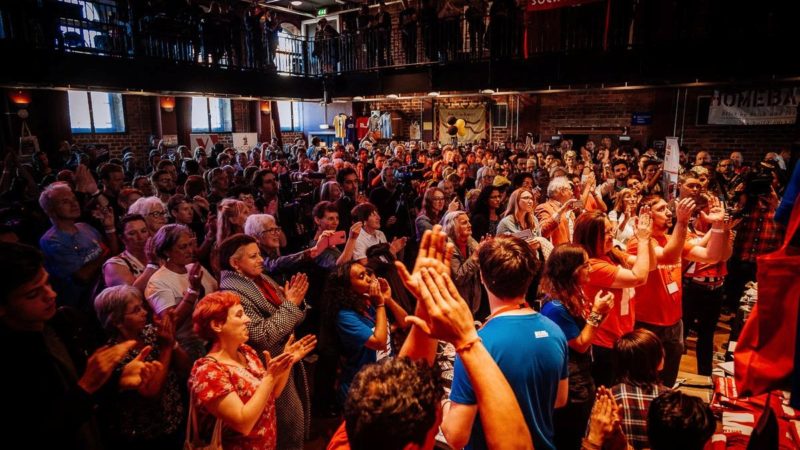
Momentum has announced today that it will start campaigning for radical policies that go beyond the Labour Party’s current commitments. In the run-up to conference in September, it will encourage local parties to pass motions in favour of a four-day working week, aiming for zero-carbon by 2030 and abolishing all migrant detention centres (not just Yarl’s Wood and Brook House). Until now, the organisation that grew out of Jeremy Corbyn’s 2015 leadership campaign has focussed on reforming internal structures and democratising party processes – this is the first time it has entered the arena of policy.
This is a big deal for Momentum. It is an exciting shift, though one that carries disadvantages as well as opportunities. There has long been a disconnect between the top of the network and its local branches, where strong criticism of chair Jon Lansman and national coordinator Laura Parker is not difficult to find. In March, for instance, the meeting agenda of Camden Momentum – where many who now work in the leader’s office and party HQ started out – threw the divides into sharp relief, with items including “actions of Jon Lansman” and “upcoming “trial” of Jackie Walker”. The local-national battle has been described as ‘Lansmanites vs cranks’, which may be reductionist and unhelpful to the left but does touch on a reality that is usually ignored by mainstream media coverage of Momentum.
Much of the infighting centres on Labour’s ongoing antisemitism crisis, but there are also differences of opinion on Brexit. Parker, now standing as an MEP candidate, is anti-Brexit, while Lansman is supportive of his colleague but hesitant about another referendum and closer to the leadership’s position. Momentum has been relatively quiet since Labour conference 2018: the next opportunity to change party rules was far away and at a national level it wanted to stay out of the all-consuming Brexit fray. A new focus on policy will allow the group to take the lead on something important to Labour members once again.
The most effective way of determining policy for the next election is not to get motions approved by conference. Dare I say it, the (in)famous Brexit composite is proof enough of that, having been followed perhaps in letter but not in spirit. No, the most direct method is to change the composition of the ‘Clause V’ meeting that agrees the manifesto (a reform still on the back burner) and lobby its attendees.
Approving motions at the local level is a crucial first step, however – and one that reaps other benefits. It will hopefully make local party meetings, which are horrible affairs in my London-centric experience, more pleasant. When I joined Labour at 16, I mistakenly thought monthly gatherings would be full of policy debates, and was instead greeted by unfriendly people using baffling acronyms and voting on frankly dull motions.
There is no use pretending that intense factional clashes can be avoided. The decision to move into policy-making will open up fresh wounds, too. First, the process will be questioned. Momentum’s initial policy endorsements were settled on by the national coordinating group (NCG), which agreed to support motions brought externally by campaign groups such as Labour for a Green New Deal. The case for the defence says NCG members are elected annually by the whole membership, so this is democratic. But expect vocal activists to call for a more grassroots-driven means of selecting policies to take over in the future.
Second, there is always a fight over anything more complex than ‘we love the NHS’. Although a low-carbon economy and the closure of all detention centres might appear to be unity issues for the left, the last few years would suggest otherwise. Unite the Union, a key player in Corbyn’s office and major source of funding for Labour, backed Heathrow expansion – and Labour MPs were given a free vote despite the project failing the party’s four tests. As for enforcing controls on immigration, whether Labour should support freedom of movement post-2016 referendum result continues to be a highly controversial topic.
Momentum openly acknowledges that its new direction was partly triggered by the creation of Tom Watson’s Future Britain Group. Labour’s deputy leader reckons the party needs to work more on policy, and that this is a good way of keeping the Corbynsceptics enthused – if they remember why they’re in Labour, they’ll hesitate to cut up their membership cards. Corbynites see the move as a threat to water-down Labour’s radical programme for change. As if to prove their point, FBG’s policy coordinator Darren Jones this morning publicly criticised the new energy policy announcements.
At conference last year, Momentum was judged by Labour First’s Luke Akehurst to have “snapped defeat from the jaws of victory”. That was a harsh assessment. The organisation succeeded in reforming the trigger ballot system, making it easier to deselect a local MP, and helped lower the leadership nomination threshold. Nonetheless, trade unions were the real winners of that week’s events. Confronting Watson and his allies is desirable, but policy engagement is a risk if Momentum wants to avoid coming up against the unions.
Is shifting towards policy a good idea for Momentum? Despite the many drawbacks outlined above, the answer is probably yes. The left is not going to resolve its internal differences over Brexit anytime soon, and – partly as a result of that fact – the activist base is largely feeling glum. This fresh direction will reinvigorate Labour members and remind the left of its raison d’être: pushing for radical socialist change.




More from LabourList
Letters to the Editor – week ending 15th February 2026
‘Labour council candidates – it’s tough, but all is not lost’
‘Labour won’t stop the far right by changing leaders — only by proving what the left can deliver’